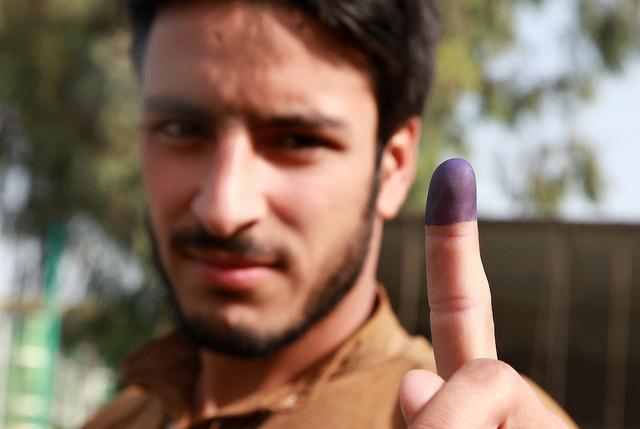
The Afghan elections are now over, yet the recount of 8.1 million votes due to allegations of mass fraud is progressing slowly, with no clear winner yet in sight. Once a winner is declared, the losing candidate will be appointed to the role of ‘chief executive‘ and share power with the president. Ian Dudgeon’s recent AIIA piece underscored the challenges faced in securing a ‘credible’ recount and discussed the presidential candidates, Ashraf Ghani and Abdullah Abdullah.
On the positive side, the international coalition will be well served by whichever candidate is successful. Both Ghani and Abdullah are competent leaders and viable partners for the international community.
But there are significant differences between the two, beyond ethnicity. So I’d like to explore briefly how the backgrounds of both candidates may impact the credibility of the election outcome and what that would mean for Afghanistan’s future.
Let’s start with Ghani. Born in Kabul, he left in his early 20s to study at the American University in Beirut and later pursued a master’s degree at Columbia University. When war broke out with the Soviets in Afghanistan, Ghani remained in exile. During that time, he adopted American citizenship and developed a reputation as a professor and skilled technocrat. On 11 September 2001, Ghani led the development of country strategies and policies for the World Bank from Bethesda, just miles from Washington DC. Following the fall of the Taliban, Ghani moved back to Afghanistan.
Since returning, Ghani has certainly done his part to put Afghanistan back on the rails. He worked as the Afghan finance minister from 2002 to 2004, and then took over as chancellor of Kabul University. He also served as Karzai’s Transition Coordinator, working with the Afghans and the international community to transition security for the country back under the leadership of the Afghan National Security Forces.
Still, Ghani’s more of an international figure than most like to acknowledge. In the earliest days of the intervention in Afghanistan, he was a special advisor to the UN’s Special Envoy to Afghanistan, where he was influential in shaping the Bonn Agreement that led to democratic government in Afghanistan. Ghani was also a US citizen until 2009, when he renounced his citizenship in order to run for president, garnering just 3% of the vote. By his own admission, Ghani was ‘unelectable’ then—a professorial former World Bank official, who seemed more Western than Afghan. Although he has since become more accustomed to traditional dress and acclimated to playing Afghan politics, his Western training is still evident, if better disguised.
The other candidate, Dr Abdullah Abdullah, is generally identified with the minority Tajik ethnic group. Abdullah has a long, continuous history within Afghanistan. While Ghani was in the US, Abdullah became a medic with the Northern Alliance, fighting against the Soviet occupation. He then became a close adviser to and spokesman for its leader, Ahmed Shah Massoud, who later led the resistance to the Taliban regime and is widely viewed as a hero of Afghanistan’s struggle. Abdullah acted as caretaker of the Foreign Ministry for Afghanistan’s government-in-exile from 1999 until the collapse of the Taliban, when he then became Afghanistan’s foreign minister. He came in second in the 2009 presidential elections, where he bowed out of the run-off elections, under international pressure, after alleging massive fraud on the part of President Karzai.
Given their different backgrounds, is the current election just a contest between two Afghans from rival ethnic groups, as commonly portrayed? Both candidates are smart, proven leaders supportive of the international community’s long-term goals for Afghanistan. Both have worked extensively with the international community in the past decade. But only Ghani has worked for the international community. He was nominated for the role of UN Secretary General and endorsed by the Wall Street Journal. In 2007, the New York Times endorsed him as President of the World Bank. Ghani is Afghan, but also an international technocrat, with more of his adult life lived outside of Afghanistan then within it.
Although Ghani understands what the international community cares about, and what Afghanistan needs to be do to retain its support, his background may prove to be problematic. For one, if he chose the path of a reformist, he could easily be labelled a puppet of the West. He’s already aware that his professorial persona has been cultivated in the West.
Ghani may prove more difficult for Western leaders to work with in the long run, à la Karzai, if he feels the need to prove his Afghan heritage to the population. Abdullah has little to prove in that regard, and has shown himself to be an effective interlocutor with and supporter of the international effort. While Abdullah may not understand the international community’s concerns quite as readily as Ghani, his sense of personal vulnerability is less likely to colour the debate.
A credible, widely-accepted win by either candidate will be good for Afghanistan, the international community, and Australia. But history and personal relationships matter greatly in this part of the world. Those will shape the conduct of Afghanistan’s future leader, whoever it may be.
Brieana Marticorena is a visiting fellow at ASPI. Image courtesy of Flickr user ISAFmedia.